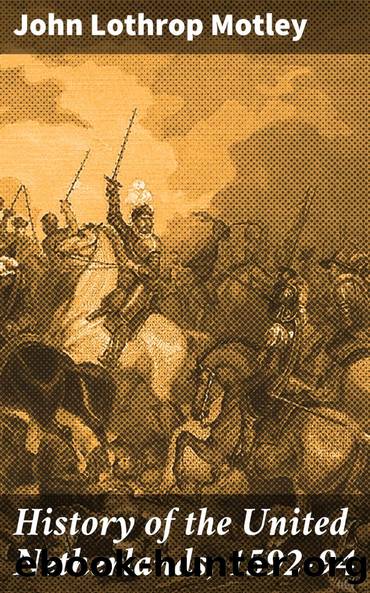History of the United Netherlands, 1592-94 by John Lothrop Motley

Author:John Lothrop Motley [Motley, John Lothrop]
Language: eng
Format: epub
ISBN: 9781522899921
Google: Ua_hjgEACAAJ
Publisher: CreateSpace Independent Publishing Platform
Published: 2015-12-24T00:36:07+00:00
CHAPTER XXIX.
Table of Contents
Effect of the death of Farnese upon Philip's schemesâPriestly flattery and counselâAssembly of the States-General of Franceâ Meeting of the Leaguers at the LouvreâConference at Surene between the chiefs of the League and the "political" leadersâHenry convokes an assembly of bishops, theologians, and othersâStrong feeling on all sides on the subject of the successionâPhilip commands that the Infanta and the Duke of Guise be elected King and Queen of Franceâ Manifesto of the Duke of MayenneâFormal re-admission of Henry to the Roman faithâThe pope refuses to consent to his reconciliation with the ChurchâHis consecration with the sacred oilâEntry of the king into ParisâDeparture of the Spanish garrison from the capital âDissimulation of the Duke of MayenneâHe makes terms with Henryâ Grief of Queen Elizabeth on receipt of the communications from France.
During the past quarter of a century there had been tragic scenes enough in France, but now the only man who could have conducted Philip's schemes to a tragic if not a successful issue was gone. Friendly death had been swifter than Philip, and had removed Alexander from the scene before his master had found fitting opportunity to inflict the disgrace on which he was resolved. Meantime, Charles Mansfeld made a feeble attempt to lead an army from the Netherlands into France, to support the sinking fortunes of the League; but it was not for that general-of-artillery to attempt the well-graced part of the all-accomplished Farnese with much hope of success. A considerable force of Spanish infantry, too, had been sent to Paris, where they had been received with much enthusiasm; a very violent and determined churchman, Sega, archbishop of Piacenza, and cardinal- legate, having arrived to check on the part of the holy father any attempt by the great wavering heretic to get himself readmitted into the fold of the faithful.
The King of Spain considered it his duty, as well as his unquestionable right, to interfere in the affairs of France, and to save the cause of religion, civilization and humanity, in the manner so dear to the civilization-savers, by reducing that distracted countryâutterly unable to govern itselfâunder his sceptre. To achieve this noble end no bribery was too wholesale, no violence too brutal, no intrigue too paltry. It was his sacred and special mission to save France from herself. If he should fail, he could at least carve her in pieces, and distribute her among himself and friends. Frenchmen might assist him in either of these arrangements, but it was absurd to doubt that on him devolved the work and the responsibility. Yet among his advisers were some who doubted whether the purchase of the grandees of France was really the most judicious course to pursue. There was a general and uneasy feeling that the grandees were making sport of the Spanish monarch, and that they would be inclined to remain his stipendiaries for an indefinite period, without doing their share of the work. A keen Jesuit, who had been much in France, often whispered to Philip that he was going astray.
Download
This site does not store any files on its server. We only index and link to content provided by other sites. Please contact the content providers to delete copyright contents if any and email us, we'll remove relevant links or contents immediately.
| Belgium | France |
| Germany | Great Britain |
| Greenland | Italy |
| Netherlands | Romania |
| Scandinavia |
Room 212 by Kate Stewart(5105)
The Crown by Robert Lacey(4807)
Endurance: Shackleton's Incredible Voyage by Alfred Lansing(4769)
The Iron Duke by The Iron Duke(4349)
The Rape of Nanking by Iris Chang(4203)
Joan of Arc by Mary Gordon(4100)
Killing England by Bill O'Reilly(3995)
Say Nothing by Patrick Radden Keefe(3975)
I'll Give You the Sun by Jandy Nelson(3428)
Shadow of Night by Deborah Harkness(3359)
Hitler's Monsters by Eric Kurlander(3328)
Mary, Queen of Scots, and the Murder of Lord Darnley by Alison Weir(3200)
Blood and Sand by Alex Von Tunzelmann(3195)
Eleanor & Park by Rainbow Rowell(3152)
Darkest Hour by Anthony McCarten(3119)
Margaret Thatcher: The Autobiography by Thatcher Margaret(3079)
Book of Life by Deborah Harkness(2931)
Red Famine: Stalin's War on Ukraine by Anne Applebaum(2928)
The One Memory of Flora Banks by Emily Barr(2857)
